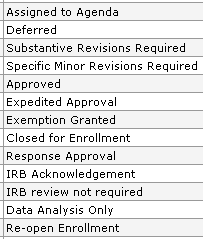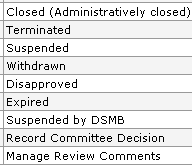Protocol Action Type
The Protocol Action Type maintenance document is used to create new and edit existing action codes and names. Each name for an action has a numeric value associated with it, and the out-of-box product contains approximately 40 of them.
These records are numeric codes and textual description values which are stored in database tables. This data serves as reference information that is made available for display and selection in various areas of the system, including other e-docs.
|
|
Existing Value Modification: Existing values may be edited as long as the description is synonymous with the original term. New values can be added. You should not delete existing values. |
Document Layout

Figure 1070 Protocol Action Type Maintenance Document Example Layout
Edit Protocol Action Type Section
The Edit Protocol Action Type section of the Protocol Action Type maintenance document is a unique section that allows you to specify and maintain the details associated with the reference table record in fields.
Table 732 Protocol Action Type Maintenance Document - Edit Protocol Action Type Section Field Descriptions
|
Field |
Description |
|
Protocol Action Type Code |
Type a numeric value to uniquely represent the protocol action type in the system table record.
|
|
Description |
Type the textual name of the type of protocol action to which it is commonly referred as (for example, Protocol Created, Submitted to IRB, Renewal Created, Amendment Created, Request For Termination, Request To Close, Request For Suspension, Request for Withdrawal, Request to Close Enrollment, Notified Committee, Correspondence Generated, Renewal Reminder Generated, Reminder to IRB Notification Generated, Administrative Correction, Request for Data Analysis Only, Request to Re-open Enrollment, Notify IRB, Assigned to Agenda, Deferred, Substantive Revisions Required, Specific Minor Revisions Required, Approved, Expedited Approval, Exemption Granted, Closed for Enrollment, Response Approval, IRB Acknowledgement, IRB review not required, Data Analysis Only, Re-open Enrollment, Closed (Administratively closed), Terminated, Suspended, Withdrawn, Disapproved, Expired, Suspended by DSMB, and Record Committee Decision.) |
|
Trigger Submission |
Select if you want this action, when taken, to also cause a submission action to occur. |
|
Trigger Correspondence |
Select if you want this action, when taken, to also cause a correspondence notification to be sent. |
|
Final Action for Batch Correspondence |
Select if you want this action, when taken, to also cause a final disposition action for batch correspondence. |
Examples



Figure 1071 Protocol Action Type Description Value Examples
Common Features
This maintenance document includes the following features that are common to most KC maintenance documents:
Table 733 Links to Common Maintenance Document Component Instructions
|
Common Maintenance E-Doc Component |
Cross-Reference Links To Usage Instructions |
|
Document Header |
|
|
Document Overview Section |
|
|
Notes and Attachments Section |
|
|
Ad Hoc Recipients Section |
|
|
Route Log Section |
|
|
Action Buttons |
|
Process
|
|
For information about searching for, initiating, editing, copying, submitting, saving, closing, canceling, and/or routing a maintenance document, see “Common Maintenance E-Doc Operations” on page 129 in the Overview section. |


